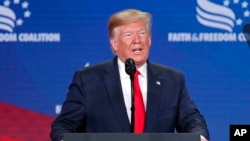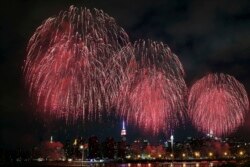As President Trump prepares for a key meeting with Chinese President Xi Jinping at the G-20 summit in Osaka later this week, cities and towns across the country are gearing up for annual Independence Day celebrations -- events that could look very different in 2020 if the two leaders are unable to resolve a deepening conflict over trade.
The United States has already imposed tariffs on $200 billion in annual imports from China, and is threatening to increase that figure to $500 billion, covering virtually everything shipped from China to the United States. Among the thousands of items that could be affected are the fireworks that Americans are used to seeing burst in the air over their July 4th picnics and barbecues.
This year’s celebrations aren’t going to be affected, Julie Heckman, executive director of the American Pyrotechnics Association, said in an interview. But if the tariffs are allowed to kick in, she warned, “The 2020 4th of July, the season could be significantly impacted.”
Heckman, whose group represents both retail fireworks vendors and professional fireworks display companies, said that Americans wouldn’t have to wait a year to see the effects. Tariffs imposed this summer would likely begin to take a toll later this year, raising the cost of fireworks displays at Christmas and New Year’s Eve.
Despite President Trump’s repeated claim that it is China that pays tariffs on the goods it sells, evidence collected by economists and other researchers has shown that the overwhelming majority of the cost is actually borne by U.S. consumers. The same thing will happen if fireworks are hit by a 25% levy, Heckman said.
“For retailers, most likely, they're going to have to pass on at least 20%,” she said. “And for the small displays companies, the margins are so narrow right now...that I can see them passing the full 25% on to their clients. I just don't think there's any wiggle room for the display industry to absorb [the costs].”
Every year, Heckman said, there are some 16,000 fireworks displays mounted across the country during the July 4 week alone, the vast majority of which are sponsored by small towns and municipalities. A 25% price hike, she said, could put the displays out of reach for many.
Over seven days of hearings this week, Heckman was one of more than 300 representatives of various industries who testified before the Office of the U.S. Trade Representative on the question of tariffs. Many or most of the witnesses were seeking to convince the USTR to carve out exemptions from the new tariffs.
Sarah Moe, the federal affairs manager for the greeting cards giant Hallmark, warned the agency that the tariffs would have a major impact on both the company’s card business and its sales of Christmas ornaments and keepsakes. The follow-on effects would be reduced sales at the company’s string of storefronts, which are independently owned and operated, as well as reduced revenue for the U.S. Postal Service, as consumers send fewer cards through the mail.
Glenn Hughes, president of the American Sportfishing Association, said that a 25% increase would cause “disproportionate economic harm to the majority of our industry,” adding that more than 90 percent of sportfishing operations in the country are small businesses.
“A 25 percent tariff on fishing related equipment won't be paid by the Chinese companies,” he said. “It will be paid by these small businesses here in the U.S., and some, if not all, the cost will be passed on to the American families.”
Like many of his fellow witnesses, Ralph Ives, executive vice president of the Advanced Medical Technology Association (AdvaMed), took pains to say that his group supports the administration’s overall goal of forcing China to comply with international trade rules and to eliminate policies that give domestic Chinese firms competitive advantages over foreign competition.
"AdvaMed supports the Administration's determination to ensure that China abides by international trade rules that have served the global community well since 1948,” he said, adding that AdvaMed has “long called for comparable reciprocal market access for medical technology trade between the United States and China.”
However, he said, his organization doesn’t believe that imposing tariffs on medical equipment – something that countries have generally avoided for humanitarian reasons – is likely to achieve those ends.
“These tariffs are not helping our industry compete in China and are likely to be imposing costs on U.S. health care,” Ives said.
These and other U.S. industries will have a nervous eye on Osaka this week, as President Trump has indicated that the results of his talks with President Xi will weigh heavily on his decision about whether to proceed with the imposition of new tariffs. In recent days, though, both Washington and Beijing have sent signals indicating a hard-line approach to the meeting, which doesn’t bode well for next year’s Fourth of July picnics.










